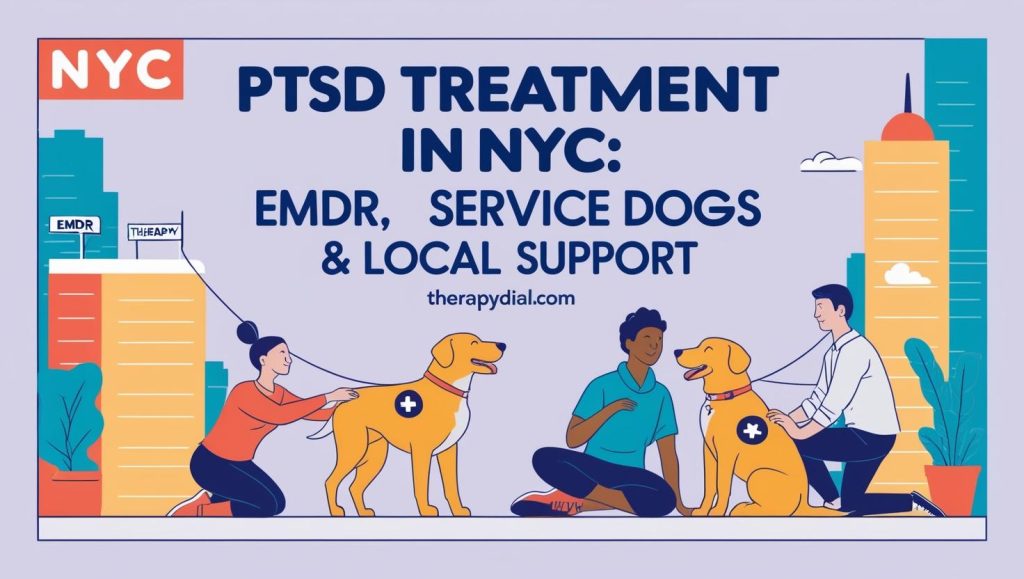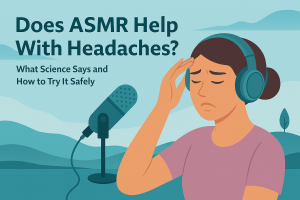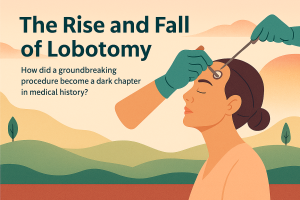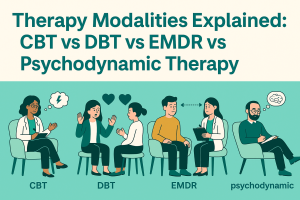Living in a fast-paced, chaotic city like New York can be overwhelming on its own. But for someone living with post-traumatic stress disorder (PTSD), the city’s constant noise, crowds, and unpredictability can make daily life feel unmanageable.
Thankfully, NYC offers a range of targeted, evidence-based treatments and compassionate support for those coping with PTSD. From EMDR therapy to service dog programs and community resources, help is closer than you think.
Let’s dive deep into how New York City supports individuals struggling with PTSD—and how you can access the right treatment for you or a loved one.
Understanding PTSD: A Brief Overview
What Is PTSD?
Post-Traumatic Stress Disorder, commonly known as PTSD, is a mental health condition triggered by experiencing or witnessing a traumatic event. This could be anything from military combat and physical assault to a car accident or natural disaster. It’s not a sign of weakness—it’s a serious condition that can disrupt every aspect of life.
Unlike typical stress responses that fade over time, PTSD symptoms persist, sometimes for months or years. People with PTSD often experience flashbacks, nightmares, severe anxiety, and intrusive thoughts that won’t go away.
They may avoid certain places or people that remind them of the trauma and can become hyper-vigilant, irritable, or emotionally numb.
Common Causes and Symptoms
In NYC, PTSD affects a diverse population—veterans, first responders, survivors of domestic violence, immigrants who’ve fled war zones, and many others. Common symptoms include:
-
Flashbacks or reliving the traumatic event
-
Nightmares and insomnia
-
Intense fear, guilt, or shame
-
Social withdrawal and emotional numbness
-
Difficulty concentrating and irritability
-
Physical symptoms like headaches and fatigue
PTSD doesn’t look the same for everyone. That’s why personalized care is so crucial, especially in a city as multifaceted as New York.
The Need for Tailored Treatment in NYC
New York City’s unique demographic diversity, high-stress environment, and cultural richness make it essential to have a wide range of PTSD treatment options. Culturally competent care—that is, therapy that respects and integrates the individual’s cultural background—is key to making treatment effective.
In addition, many people in NYC face barriers such as financial stress, lack of insurance, or stigma about mental health care. That’s where innovative and inclusive programs in the city step in, offering both conventional and alternative approaches.
Eye Movement Desensitization and Reprocessing (EMDR)
How EMDR Works
EMDR stands for Eye Movement Desensitization and Reprocessing, a psychotherapy technique developed in the late 1980s by Francine Shapiro. It’s especially effective for people dealing with PTSD. The idea behind EMDR is simple yet powerful—it helps reprocess traumatic memories so they are less emotionally disturbing.
Here’s how a typical EMDR session works:
-
Assessment and History Taking: The therapist gets to know the client’s trauma history and identifies the specific memories to target.
-
Desensitization: While focusing on the traumatic memory, the client is guided through bilateral stimulation—usually side-to-side eye movements, taps, or tones.
-
Reprocessing: The brain starts to “digest” the traumatic memory and integrate it with more adaptive thoughts and emotions.
-
Closure and Re-evaluation: Each session ends with grounding and a review of progress.
Studies have shown EMDR to be just as effective—if not more—than traditional talk therapy for PTSD. It works fast for many people, sometimes in as few as 6–12 sessions.
EMDR Clinics and Therapists in NYC
New York City is home to some of the most skilled and certified EMDR practitioners. Some top clinics offering EMDR therapy in NYC include:
Many therapists in private practice are also trained in EMDR. You can find a directory of certified practitioners on the EMDR International Association website.
Benefits and Limitations of EMDR for PTSD
Benefits:
-
Non-invasive and medication-free
-
Can produce rapid results
-
Works well for complex trauma and childhood abuse
-
Less verbal, which is ideal for those who struggle to talk about their trauma
Limitations:
-
Not suitable for everyone (e.g., those with severe dissociation)
-
Requires a trained professional, not a DIY method
-
May temporarily intensify emotional symptoms before improvement
Still, EMDR is a game-changer for many in NYC seeking fast, effective relief from PTSD.
The Role of Service Dogs in PTSD Treatment
How Service Dogs Support PTSD Recovery
Imagine being so anxious you can’t leave your apartment. Now imagine a loyal service dog that gently nudges you when you’re spiraling, reminds you to take medication, or literally creates physical space between you and a crowd. That’s the life-changing power of a PTSD service dog.
Service dogs trained for PTSD don’t just provide emotional support—they perform specific tasks like:
-
Waking you from nightmares
-
Blocking others from getting too close
-
Leading you out of stressful environments
-
Reminding you to take medication
-
Applying pressure therapy during panic attacks
They’re trained over many months to respond to their handler’s specific symptoms. And they offer unconditional love that no medication or therapist can match.
NYC Programs That Provide PTSD Service Dogs
There are several outstanding programs in NYC and nearby areas that provide or connect individuals with PTSD to trained service dogs:
Some programs are veteran-focused, while others serve civilians too. Many offer training support, matching services, and even help with funding.
Success Stories from Veterans and Civilians
Take John, a retired NYPD officer, who developed severe PTSD after 9/11. After years of therapy with little improvement, he was matched with Rex, a golden retriever trained to interrupt anxiety spirals. “He saved my life,” John says.
Then there’s Maria, a domestic violence survivor, who couldn’t sleep through the night until she got Luna, a rescue trained to wake her from flashbacks and provide comfort. “She’s my safety net,” Maria shares.
These aren’t just cute dog stories—they’re real examples of how service animals are transforming PTSD care in NYC.
Local Therapy and Support Options in NYC
Community Mental Health Clinics
For many New Yorkers, private therapy might feel financially out of reach—but that doesn’t mean quality mental health care is off the table. Community mental health clinics across the five boroughs provide accessible, often sliding-scale or free PTSD treatment.
These clinics typically offer:
-
Individual and group therapy
-
Psychiatric evaluations and medication management
-
Trauma-focused cognitive behavioral therapy (TF-CBT)
-
EMDR, DBT, and other modalities
Some top clinics to consider in NYC include:
Most accept Medicaid and many have Spanish- and Mandarin-speaking providers. There’s no shame in walking into a public health clinic—healing is healing, and access matters more than setting.
Specialized PTSD Support Groups
Sometimes what you need most is to sit in a room (virtual or physical) and be heard by someone who gets it. PTSD support groups offer safe, judgment-free spaces to connect with others walking a similar path.
In NYC, you’ll find a wide variety of support group options:
-
Veterans’ PTSD groups through the Veterans Affairs NY Harbor Healthcare System
-
Trauma survivor groups at Safe Horizon
-
Therapist-led groups at NYU Langone Psychiatry
Many of these groups are free or low-cost and may focus on specific trauma types (military, sexual assault, childhood trauma). In-person groups are great, but online options have grown post-COVID, giving even more flexibility to fit your schedule.
Non-Profit and Government Resources
NYC is a city of resources—you just need to know where to look. Several non-profits and government programs specialize in helping trauma survivors access care and navigate the healthcare system.
Some standout resources include:
-
Safe Horizon: The nation’s largest victim services agency. Offers counseling, advocacy, and emergency housing for domestic violence and abuse survivors.
-
NYC Well: A free, 24/7 mental health hotline and referral service.
-
Mayor’s Office of Community Mental Health: Coordinates programs like Connections to Care and ThriveNYC.
You can also find assistance applying for Medicaid, navigating insurance, and locating trauma-informed care providers through these channels.
Choosing the Right PTSD Treatment Path
Factors to Consider
Choosing the right treatment for PTSD isn’t a one-size-fits-all decision—it’s personal, and it depends on several key factors:
-
Severity of Symptoms: Are you managing daily life, or are symptoms overwhelming your functioning?
-
Type of Trauma: Military trauma may respond differently to therapy than childhood abuse.
-
Accessibility: Do you need sliding-scale pricing, telehealth options, or services in another language?
-
Comfort with Modalities: Would you prefer talking therapy, body-based approaches, or something more structured like EMDR?
-
Cultural Fit: Does the therapist understand your cultural background or life experience?
Taking a few moments to reflect on these can make a huge difference in how successful your treatment is. And in NYC, the diversity of options means there is something out there that suits your needs.
Combining Therapies for Better Results
In many cases, combining multiple treatment methods yields the best outcomes. Think of it as a mental health toolkit—you might not just use a hammer when you’ve also got a wrench and screwdriver available.
Here’s a sample combination plan that’s working for many PTSD patients in NYC:
-
Primary treatment: EMDR or trauma-informed CBT
-
Supportive care: Group therapy for connection and validation
-
Medication: As prescribed by a psychiatrist to manage anxiety, depression, or sleep issues
-
Lifestyle therapy: Yoga, mindfulness, or art therapy
-
Companion support: Service dog or emotional support animal
Integrated care models are becoming more popular in NYC clinics, with care coordinators who work across multiple providers to ensure continuity.
Finding Culturally Competent Care in NYC
With over 200 languages spoken in NYC, cultural competence is more than just a buzzword—it’s a necessity. Trauma doesn’t exist in a vacuum; it’s shaped by culture, language, and lived experience.
When searching for care, look for therapists or clinics that highlight:
-
Multilingual staff
-
Culturally specific services (e.g., for LGBTQ+, BIPOC, or immigrant populations)
-
Trauma training with an anti-racist framework
-
Religious/spiritual understanding where relevant
Organizations like The Arab-American Family Support Center, Callen-Lorde Community Health Center, and The Jewish Board specialize in this kind of nuanced, identity-affirming care.
Innovative PTSD Treatments Emerging in NYC
Virtual Reality Therapy and PTSD
Imagine putting on a VR headset and entering a controlled environment where you can safely confront and reprocess your trauma. That’s not science fiction—it’s virtual reality exposure therapy (VRET), and it’s being tested and used in NYC as a cutting-edge treatment for PTSD.
Especially helpful for veterans and first responders, VRET allows therapists to simulate combat zones, car accidents, or public spaces where trauma occurred. The immersive nature helps desensitize the brain while providing a controlled and supportive setting.
Institutions like NYU Langone and private practices with advanced tech are beginning to integrate VR for PTSD into their offerings, showing impressive results for some of the most treatment-resistant cases.
Ketamine-Assisted Psychotherapy (KAP)
Another buzzworthy innovation in NYC’s mental health scene is Ketamine-Assisted Psychotherapy. Ketamine, a dissociative anesthetic, has shown rapid results in relieving PTSD symptoms when combined with psychotherapy.
Approved clinics like Nushama and Field Trip Health offer guided sessions where patients receive a controlled dose of ketamine followed by talk therapy. Many report profound breakthroughs within just a few sessions.
While not for everyone—and not a first-line treatment—KAP is providing hope for those who haven’t found relief elsewhere.
How NYC is Supporting Veterans with PTSD
Veterans Affairs and Specialized Clinics
The VA New York Harbor Healthcare System operates multiple clinics across NYC, offering everything from EMDR to cognitive processing therapy (CPT), group sessions, and even integrative therapies like acupuncture and yoga.
Veterans also have access to:
-
Vet Centers in Brooklyn, Manhattan, and the Bronx
-
Team RWB for community-based veteran events and peer support
Veteran services are often free and come with specialized understanding of military culture—a crucial factor in treatment success.
Housing, Legal, and Career Assistance
PTSD isn’t just a mental health issue—it affects your whole life. That’s why NYC programs offer wraparound services like:
-
Transitional housing via Jericho Project
-
Legal aid through NYLAG’s Veterans Practice
-
Career training and job placement via Workforce1
Veterans with PTSD aren’t alone, and NYC has made impressive strides in ensuring comprehensive, integrated care.
Youth and PTSD: A Growing Crisis in NYC
Teen Trauma and Early Intervention
From community violence to family trauma, many NYC teens are experiencing PTSD symptoms without even knowing it. What might look like defiance or anxiety could actually be untreated trauma.
Organizations like The Child Mind Institute and The Door NYC offer therapy, support groups, and education tailored for youth trauma. Schools are also stepping up with mental health professionals, though access remains uneven across boroughs.
Programs like ThriveNYC are pushing for more trauma-informed school practices citywide.
Family-Based Approaches
Because trauma often affects entire families, especially in underserved communities, effective PTSD care for youth involves parental support and education.
Services like:
-
Parent-child interaction therapy (PCIT)
-
Trauma Systems Therapy for Children (TST-C)
-
Home-based trauma therapy
…are helping children recover in a safe and stable environment, with emotional regulation skills that benefit the whole household.
Free and Low-Cost PTSD Resources in NYC
Sliding Scale and Free Clinics
Don’t have insurance? Don’t worry. NYC is full of low-cost mental health services that won’t turn you away:
-
Open Path Collective connects people to affordable therapy.
-
Weill Cornell Psychiatry & TherapyDial offers sliding scale trauma therapy.
-
Mount Sinai Adolescent Health Center offers free care for youth.
Always ask clinics if they offer sliding scale rates or grant-funded sessions for trauma survivors.
Crisis Hotlines and Online Therapy
For immediate help, there’s always someone you can talk to:
-
NYC Well – Call, text, or chat 24/7 at nycwell.cityofnewyork.us
-
SAMHSA’s National Helpline – 1-800-662-HELP (4357)
-
7 Cups – Online peer support and affordable counseling at 7cups.com
Many therapists now offer telehealth options—making it easier to get help from the comfort of home.
Long-Term Recovery and Life Beyond PTSD
Healing Isn’t Linear
If there’s one truth about PTSD recovery, it’s this: healing isn’t a straight line. There will be setbacks. Some treatments will work better than others. And sometimes, just getting out of bed is a win.
In NYC, you’re surrounded by people, professionals, and programs who understand that. You’re not alone, and you don’t have to suffer in silence.
Recovery takes time, but it’s absolutely possible—with the right support.
Building a Supportive Lifestyle
Living well with PTSD involves more than therapy. It’s about building a lifestyle that supports your healing:
-
Prioritize sleep and nutrition
-
Engage in gentle exercise like walking or yoga
-
Practice grounding techniques like journaling or breathing exercises
-
Surround yourself with people who uplift you
NYC offers it all—from mindfulness studios to nature in Central Park. Your new chapter doesn’t just involve recovery—it can be one of rediscovery.
Conclusion
New York City can be a tough place to live with PTSD—but it’s also one of the best places to find help. Whether you’re drawn to EMDR, a service dog, or a support group that feels like family, there are paths to healing all around you.
The city’s diversity of people is matched by a diversity of treatment options—and that’s powerful.
You’re not alone. Reach out, ask for help, and take the first step. There is life beyond trauma—and in NYC, the journey to healing is full of community, compassion, and strength.
FAQs
1. Is EMDR therapy covered by insurance in NYC?
Yes, many insurance plans in NYC cover EMDR therapy, especially if it’s provided by a licensed mental health professional. Always check with your provider and the therapist.
2. Can I get a PTSD service dog even if I’m not a veteran?
Absolutely. While many programs focus on veterans, there are civilian-focused organizations that train and place service dogs for PTSD.
3. Where can teens with PTSD get help in NYC?
Teen-focused clinics like The Door NYC and The Child Mind Institute offer free or low-cost trauma therapy tailored to youth.
4. What should I do in a PTSD crisis?
Call NYC Well (1-888-NYC-WELL) or SAMHSA’s hotline (1-800-662-HELP). Both are free, confidential, and available 24/7.
5. How long does PTSD treatment take?
It varies. Some see improvements in weeks; others need long-term support. The key is consistency and finding the right combination of therapies for you.




